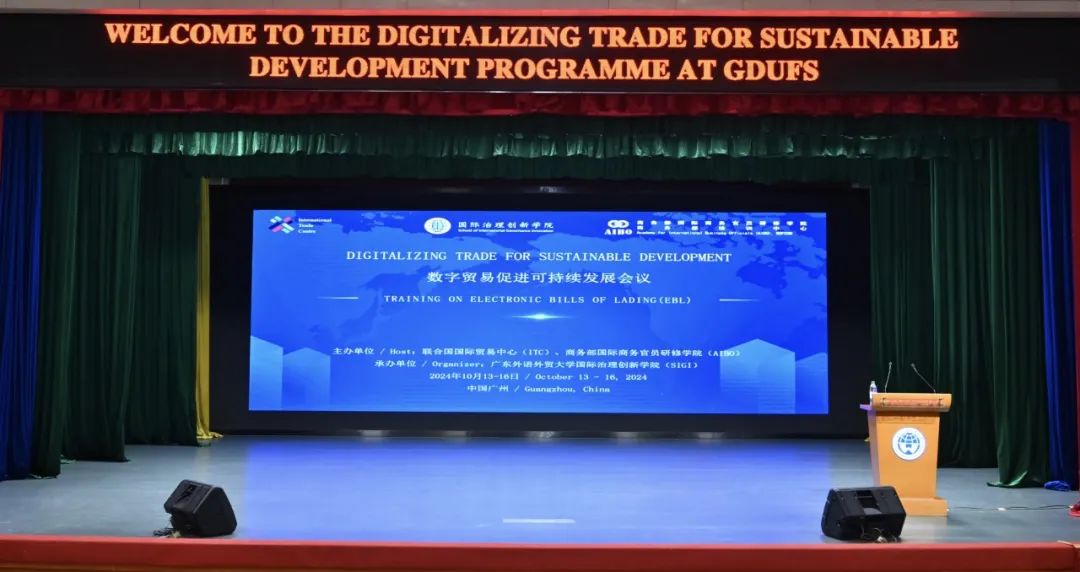
Digitalizing Trade for Sustainable Development On-Site
From October 14 to 16, 2024, the Digitalizing Trade for Sustainable Development was successfully held at Guangdong University of Foreign Studies (GDUFS), co-hosted by the International Trade Centre (ITC) and the Academy for International Business Office (AIBO) of the Ministry of Commerce and organized by the School of International Governance Innovation (SIGI) at GDUFS. Business officials from more than 30 developing countries in the Global South and officials serving in international organizations jointly discussed the current situation and future trend of digital trade development and highlighted its essential role in sustaining the development of global trade.
Opening Session

Remarks by Jiao Fangtai, Vice President, GDUFS
Before the conference, Professor Jiao Fangtai, Vice President of GDUFS, met with the guests, introduced the international cooperation conducted by GDUFS, and welcomed business officials from involved countries and experts from international organizations to expand cooperation with the university. Professor Zhao Longyue, dean of the SIGI, presided over the opening session at 9:00 AM on October 14th, as scheduled.
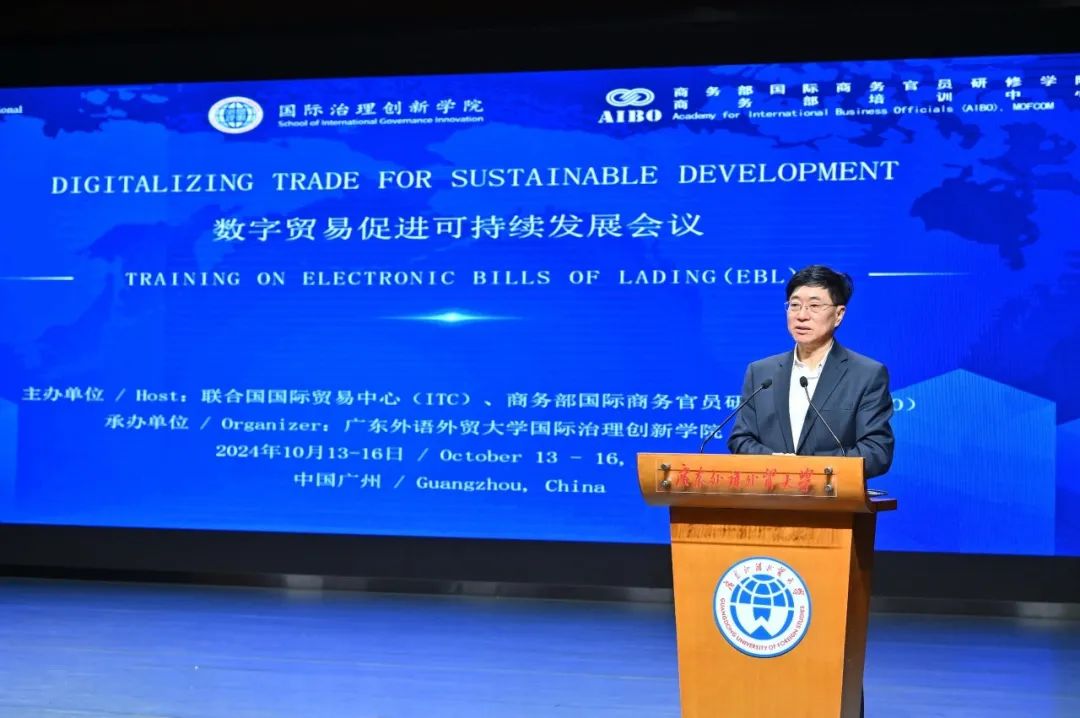
Zhao Longyue, Dean, SIGI, GDUFS
Dean Zhao Longyue first extended a warm welcome to the guests coming from afar and briefly introduced the background and significance of the conference. Afterward, Zhou Peng (Director of the International Office at GDUFS), Wang Wenqi (Deputy Director General of the Policy Research Office of Canton Municipal Committee of the Communist Party of China (CMCCPC)), Zhao Quan (Senior Programme Officer of the Division for Market Development of the ITC), and Zhang Hailong (Deputy Director of the AIBO of the Ministry of Commerce) made opening remarks respectively.
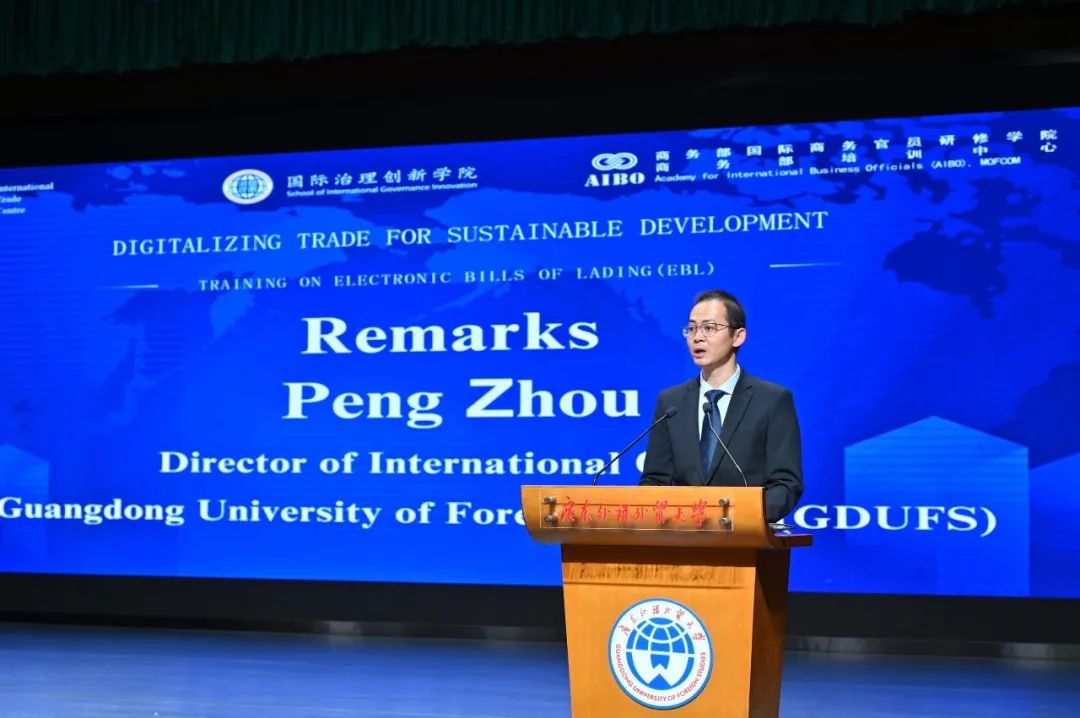
Remarks by Zhou Peng, Director, International Office, GDUFS
Zhou Peng pointed out that GDUFS, a high-level university boasting distinctive international features and multidisciplinary and multilanguage advantages, has long been dedicated to a new global trade order and a fair and just international economic system. As one of the most strategically important endeavors by GDUFS to pursue internationalization, the SIGI has already cultivated a cohort of talents engaging in global governance. Therefore, he hopes to continue the close cooperation with ITC on talent training, scientific research, and academic exchanges to jointly promote the prosperity of digital trade.

Remarks by Wang Wenqi, Deputy Director General, Policy Research Office, CMCCPC
Wang Wenqi highlighted the core position of digitalization and intelligent transformation in the digital economy era and the crucial role of electronic bills of lading (eBLs) in enhancing the efficiency, connectivity, and security of international trade. He stated that the status of Guangzhou will be elevated as a hub for high-standard opening-up and as an international trade center. We have integrated resources from international organizations, developing countries, and academic experts, supported SIGI at GDUFS in setting up a platform for exchange and cooperation among Global South countries, and established the Guangzhou Global South Research Center, thereby contributing to the digitalization of the Global South and the green and sustainable development of trade.
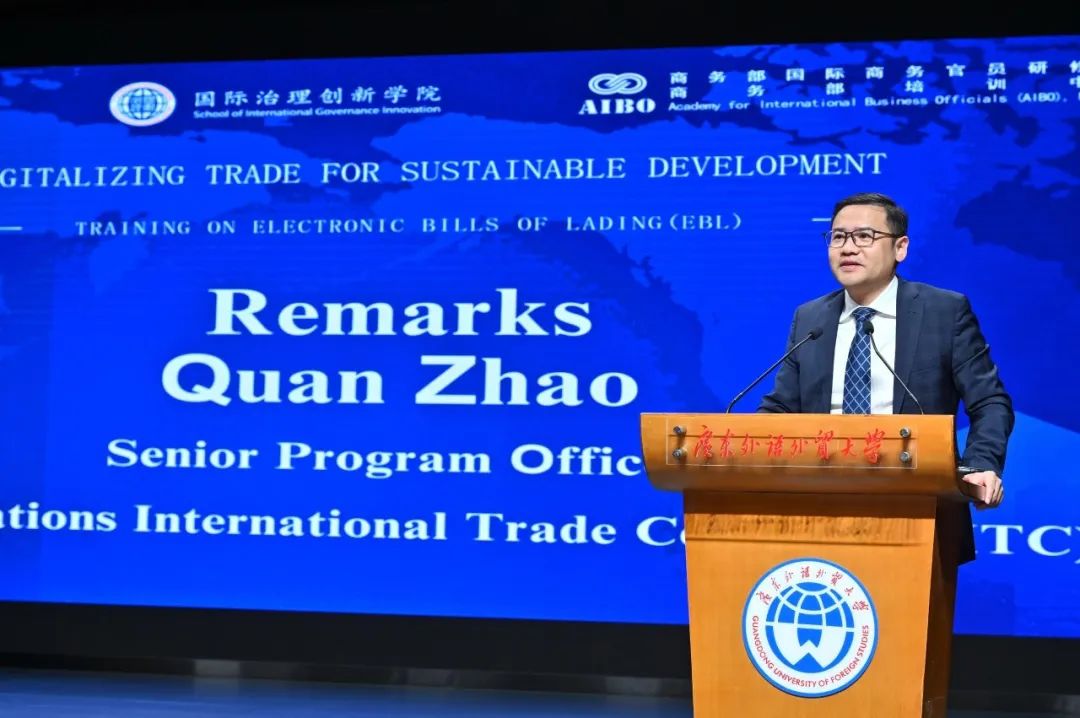
Remarks by Zhao Quan, Senior Programme Officer, Division for Market Development, ITC
Zhao Quan emphasized that cross-border e-commerce and eBLs have emerged as hot topics in international trade. He pointed out that cross-border e-commerce, in essence, is one kind of international trade and is thus required to be developed following international trade rules. Moreover, international organizations are integral to facilitating rule implementation, providing public goods, setting up fair exchange platforms, and offering development assistance. He anticipates that this meeting will catalyze cooperation on cross-border e-commerce and further exchange of ideas among countries.
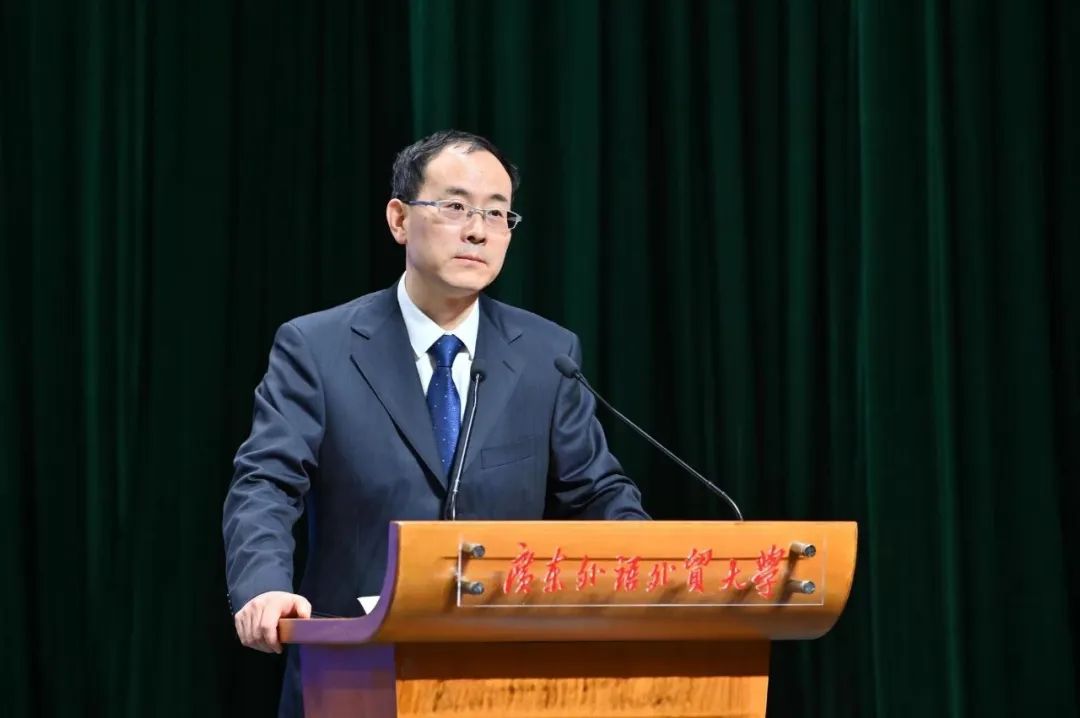
Remarks by Zhang Hailong, Deputy Director, AIBO, Ministry of Commerce
Zhang Hailong stated that Guangzhou is an international metropolis boasting unique advantages as it has focused on cutting-edge international cooperation and research in numerous fields. Guangzhou Territorial Space Master Plan 2021-2035, officially endorsed by the People’s Republic of China recently, presents a golden opportunity for Guangzhou to drive high-quality development and march towards modernization. He firmly believed that cooperation among more state departments and international organizations would undoubtedly be a strong boost to the city’s pursuit of high-quality development and modernization.
Reports and Lectures
After the opening session, lectures and discussions got off the ground.

Lecture by Zhao Quan, Senior Programme Officer, Division for Market Development, ITC
First, Zhao Quan, Senior Programme Officer of the Division for Market Development of ITC, presented a lecture on “Expediting Trade through EBLs-ITC Technical Paper”. Starting from the origin, use, and stakeholders of the bill of lading, he centered on the rise and operation mode of eBLs. He also pointed out its important role in saving time, cutting costs, and driving a green economy. However, as an emerging field, the development of eBLs also encounters numerous challenges, including the absence of a perfect certification system and a standardized process, and information security issues. Based on the above analysis, he proposed a series of suggestions for enhancing the use of eBLs.
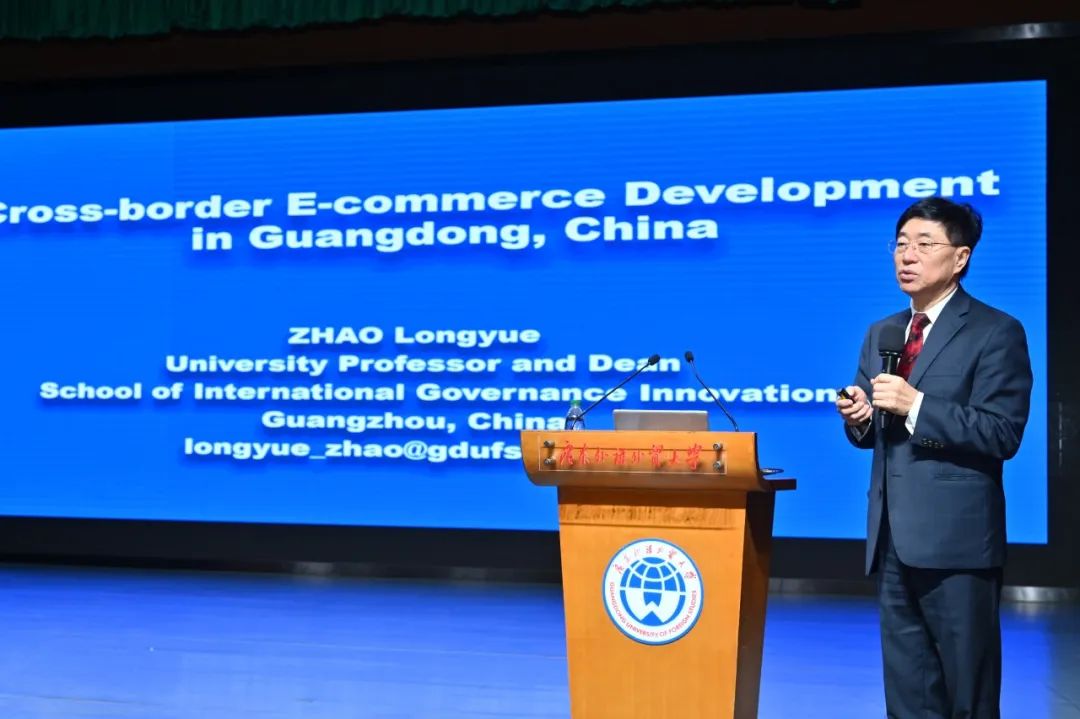
Lecture by Professor Zhao Longyue, Dean of SIGI, GDUFS
Afterward, Professor Zhao Longyue, dean of SIGI at GDUFS, delivered a special report titled “Cross-border E-commerce Development in Guangdong, China”. He first introduced the geographic location and regional advantages of Guangdong. Subsequently, by analyzing Guangdong's GDP, international trade, and cross-border e-commerce data, he demonstrated its leading position in driving the national economy and its great potential for developing cross-border e-commerce. Finally, he analyzed the main drivers for the rapid development of cross-border e-commerce in the province from multiple perspectives. Also, he welcomed governments and enterprises from the wider world to engage in the sector, build platforms, and expand cooperation to share the development dividends presented by the times!
In addition to the aforementioned offline lectures, the conference included the following online activities. First, Jonathan Koh, general manager of the Trade Facilitation Pte Ltd, shared the experiences and practices of Asian countries in handling cross-border trade documents and also introduced the headways made by the Association of Southeast Asian Nations (ASEAN) in facilitating regional trade, particularly the establishment of the ASEAN Regional Single Window. He stated that ASEAN is one of the world’s first regions to establish regional single windows. Its member States are required to set up national single windows to enable the exchange of trade documents within the region, which has noticeably facilitated the electronic exchange of trade documents and improved trade efficiency.
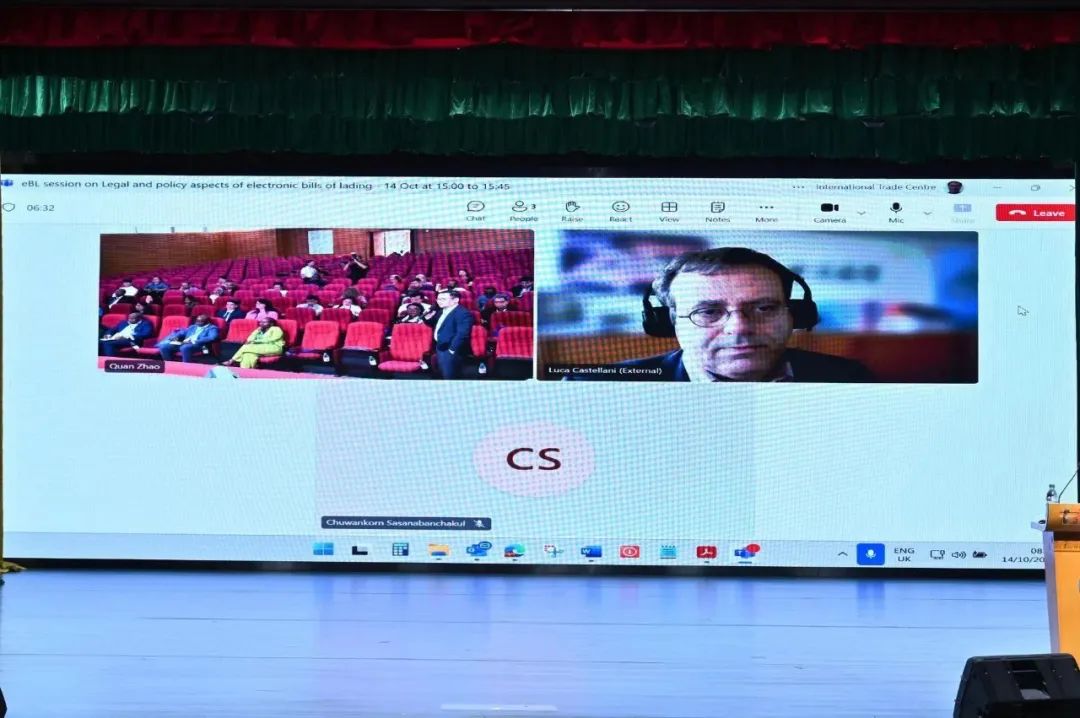
Lecture by Luca Castellani, Legal Officer, UNCITRAL
Afterward, Luca Castellani, Legal Officer of the United Nations Commission on International Trade Law (UNCITRAL), lectured on “Regulation and Policy Aspects of Electronic Bills of Lading”. He expounded on the position and role of eBLs in the international legal framework and on countries’ practices concerning related regulations and policies. Moreover, underlining the significance of eBLs in facilitating international trade and enhancing trade efficiency, he appealed for intensified cooperation among countries to improve related regulations and policies.
Following that, Pierre Bonthonneau, Senior Programme Officer of the ITC, presented ITC's global digitization efforts on the topic of “Case Studies on Trade Digitization”. He noted that despite the progress achieved in transformation, we are still baffled by the absence of a coherent strategy and by challenges regarding system interoperability. Therefore, he stressed the necessity of understanding a country's existing trade system in advance to identify the areas ripe for transformation. Furthermore, he discussed a holistic approach to trade digitalization, proposing the requirement for a unified management system to bridge isolated processes. His sharing enables participants to gain a deeper understanding of global practices and challenges of trade digitization and provides valuable references for regional digital transformation.
On October 16th, He Fangfang, the director of Unaku Fashion (Kenya) Company Limited, delivered a lecture on the topic of “How Cross-border E-commerce Empowers Small- and Medium-sized Enterprises (SMEs)”. Drawing on her extensive experience in African e-commerce, she conducted an in-depth analysis of the opportunities and challenges that e-commerce delivers to SMEs: cross-border e-commerce serves as a broad market platform for SMEs to easily reach international customers, to broaden sales channels and to build brand awareness, but challenges also arise, including product selection, market adaptation, and supply-chain management. In this regard, she introduced how Unaku supports local designers and micro- and small-sized enterprises through its e-commerce platform, facilitating them to expand market influence and enhance product design and production capabilities.
Participation in Canton Fair
The conference also included a visit to the Canton Fair, a significant window for foreign trade renowned as China's No.1 Exhibition. From cutting-edge scientific and technological products to traditional handicrafts, they all mirror China’s manufacturing industry’s extensive coverage and the latest product technologies and underline the country’s strong competitiveness and unlimited potential in global trade. This fair provided a excellent opportunity for the guests to gain insights into China’s market demands and trade policies and to recognize its crucial position in global trade and its contributions to international economic cooperation and development.
Review and Outlook
The Digitalizing Trade for Sustainable Development has successfully come to an end. It serves as not only a platform where experts and scholars, both domestic and international, to exchange ideas and share experiences, but also as a significant contributor to the development of digital trade and the extensive application of eBLs. The successful conclusion of this conference not only symbolizes another crucial contribution made by GDUFS to international governance innovation but also lays a solid foundation for future international cooperation and academic exchanges. The development of digital trade and the wide application of eBLs will usher in a new era marked by more efficient, more convenient, and greener global trade.

Group Photo Taken to Mark the Conference
